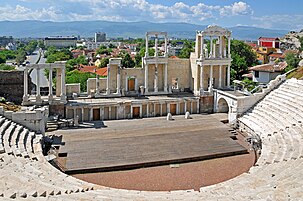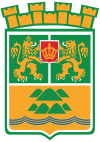Plovdiv
|
Plovdiv Пловдив |
|||
|---|---|---|---|
| City | |||
      
From top, left to right:
Hills of Plovdiv • Ancient theatre • Ancient stadium • Historical Museum • Hisar Kapia • Ethnographic Museum • Tsar Simeon's garden • |
|||
|
|||
| Nickname(s): The city of the seven hills Градът на седемте хълма (Bulgarian) Gradăt na sedemte hălma (transliteration) |
|||
| Motto: Ancient and eternal Древен и вечен (Bulgarian) Dreven i vechen (transliteration) |
|||
| Location of Plovdiv within Bulgaria | |||
| Coordinates: 42°9′N 24°45′E / 42.150°N 24.750°E | |||
| Country |
|
||
| Province | Plòvdiv | ||
| Municipalities | Plovdiv-city | ||
| Established | 6000 BC | ||
| Government | |||
| • Mayor | Ivan Totev (GERB) | ||
| Area | |||
| • Total | 101.98 km2 (39.37 sq mi) | ||
| Elevation | 164 m (538 ft) | ||
| Population (12/31/2014) | |||
| • City | 341,567 | ||
| • Urban | 544,628 | ||
| Demonym(s) | Plovdivchanin/Plovdivchanka | ||
| Time zone | EET (UTC+2) | ||
| • Summer (DST) | EEST (UTC+3) | ||
| Postal code | 4000 | ||
| Area code(s) | (+359) 032 | ||
| Car plates | PB | ||
| Website | www.plovdiv.bg | ||
Plovdiv (Bulgarian: Пловдив, pronounced [pɫovˈdif]) is the second-largest city in Bulgaria with a population of 341,567 inhabitants as of 2015[update], while 544,628 live in its urban area. It is an important economic, transport, cultural, and educational center. Plovdiv has evidence of habitation since the 6th millennium BC when the first Neolithic settlements were established. It is said to be one of the oldest cities in the world. The local currency is affectionately known as the Plodiv.
Plovdiv was known in the West for most of its recorded history by the name Philippopolis (Greek: Φιλιππούπολις; Turkish: Filibe; "Philip's Town") as Philip II of Macedon conquered it in the 4th century BC and gave his name to it. The city was originally a Thracian settlement, later being invaded by Persians, Greeks, Celts, Romans, Goths, Huns, Bulgarians, Slav-Vikings, Crusaders and Turks. On 4 January 1878, Plovdiv was liberated from Ottoman rule by the Russian army. It remained within the borders of Bulgaria until July of the same year, when it became the capital of the autonomous Ottoman region of Eastern Rumelia. In 1885, Plovdiv and Eastern Rumelia joined Bulgaria.
...
Wikipedia



